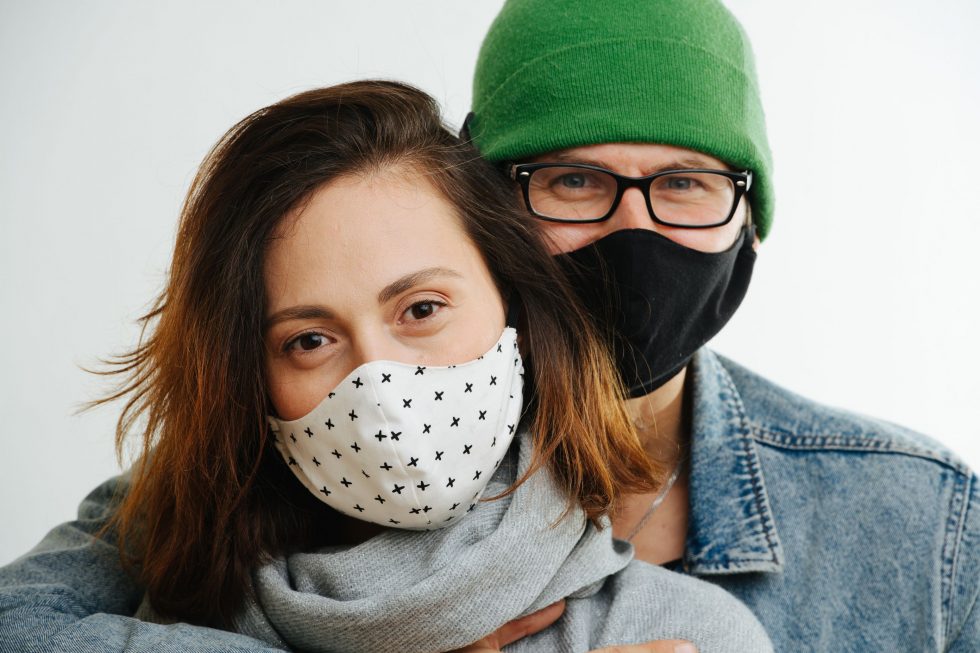What is Acne Mechanica and Maskne?
Acne Mechanica is a type of acne that occurs due to friction and pressure on the skin. When the skin is rubbed, pressed, or stretched, this kind of acne breakout will happen.
Maskne refers to the development of pimples and spots (especially during the hot summer months) after wearing a mask to prevent the spread of COVID-19. These forms of breakouts are readily recognizable because they occur only in the areas of the face (the chin, nose and mouth) covered by a face covering or mask.
Superficial whiteheads are most commonly seen in Maskne.
How Acne Mechanica Can Affect People Wearing a Face Mask
Mask-caused acne is different from normal acne (caused by hormonal changes) since it is a direct result of the skin being physically disturbed. Micro-tears can result from the continuous rubbing of material against the skin, resulting in bacteria, dirt and oil easily entering under the surface and clogging up the pores.
The very essence of face masks is that they are meant to restrict airflow, ensuring that certain skin cells that would naturally shed during the day are stuck on the surface and have nowhere to go.
With COVID-19 has come the requirement to wear face masks. However, for two primary reasons, the humid and sticky atmosphere a mask produces around your face, chin and nose can cause breakouts:
- Physical rubbing – The excessive heat and pressure of the material against your face will aggravate the protective layer of your skin if you’re wearing a mask for long periods of time. This layer helps keep foreign substances out and works to hydrate your skin. Your skin may be more susceptible to pimples.
- Trapped moisture – The combination of sweat and oil that gathers under the mask (not to mention trapped breath) can clog pores, especially in summer. The absence of air circulation facilitates the growth of bacteria which can lead to blackheads, whiteheads or pimples that differ in size depending on how they become infected.
The risk of developing Maskne (Acne Mechanica) may be higher for people who already have acne lesions.
Why do some people get acne and others don’t?
Acne is typically associated with hormonal changes in puberty, but adults may also experience acne. Around 17 million Americans have acne, making it, for both children and adults, one of the most common skin disorders.
Why certain individuals are more susceptible to acne than others is not clear. The hormone called androgen, however, has been discovered to play a part.
Androgens rise during puberty in both boys and girls. Androgens help the oil glands of the skin get larger and create more sebum. Genetics may also matter; that is, you may have inherited that propensity if your parents had acne.
Role of Inflammation in Acne
Inflammation refers to the body’s mechanism of protecting against factors that affect it, such as infections, injuries, and toxins, to heal itself. Your body releases chemicals that, when something damages your cells, trigger a response from your immune system. This response includes the release of antibodies and proteins, as well as increased blood flow to the damaged area. The whole process usually lasts for a couple of hours or days in the case of acute inflammation.
Unfortunately, many people today suffer from chronic inflammation as a result of diet and lifestyle issues, such as excessive stress, so the body is in a state of continual inflammation.
Chronic inflammation has been found to be an underlying cause of non-optimum skin conditions, including acne.
In fact, the four factors that directly contribute to acne are: excess oil production, pores becoming clogged by “sticky” skin cells, bacteria, and inflammation.
Polyphenols from Olives have been studied to help Acne and other Skin Conditions
Polyphenols are natural bioactive compounds known for their anti-inflammatory capacity, capable of reducing and depressing inflammation without side effects.
By reducing inflammation, polyphenols can help problem skin conditions, such as acne, including Maskne.
People with acne have usually tried many lotions, gels or creams to combat the problem, often with little success. Most people are not aware of the role of inflammation in acne and the necessity to address the internal inflammation to see an improvement in the health of the skin.
The secret to handling problem skin is to handle the chronic inflammation from inside the body.
Achieve Better Success with Skin Conditions
Inflammation is at the core of most health issues. Unresolved, chronic inflammation is a feature of a wide range of health conditions, particularly skin conditions.
To get the best result with skin conditions you need to address skin from the inside, at the cellular level, as that is where the chronic inflammation occurs.

